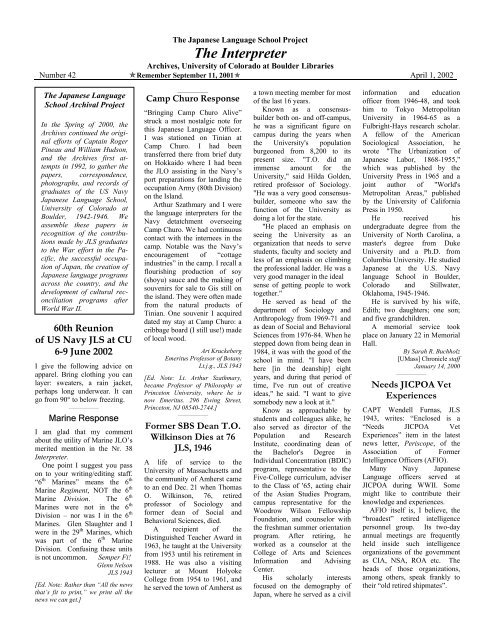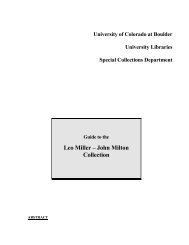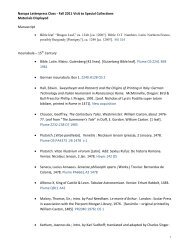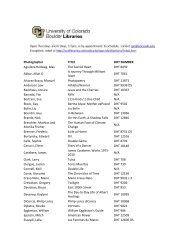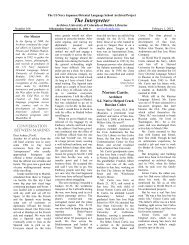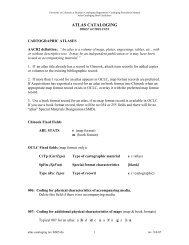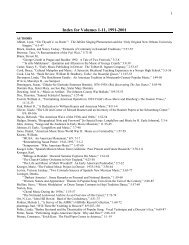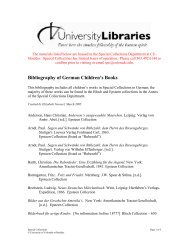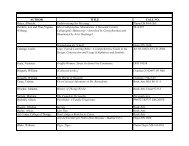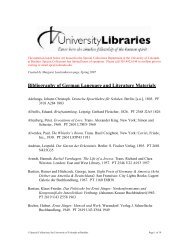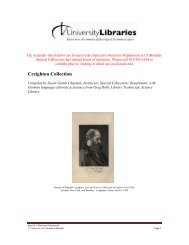The Japanese Language School Project - University Libraries ...
The Japanese Language School Project - University Libraries ...
The Japanese Language School Project - University Libraries ...
Create successful ePaper yourself
Turn your PDF publications into a flip-book with our unique Google optimized e-Paper software.
<strong>The</strong> <strong>Japanese</strong> <strong>Language</strong> <strong>School</strong> <strong>Project</strong><br />
<strong>The</strong> Interpreter<br />
Archives, <strong>University</strong> of Colorado at Boulder <strong>Libraries</strong><br />
Number 42 �Remember September 11, 2001� April 1, 2002<br />
<strong>The</strong> <strong>Japanese</strong> <strong>Language</strong><br />
<strong>School</strong> Archival <strong>Project</strong><br />
In the Spring of 2000, the<br />
Archives continued the original<br />
efforts of Captain Roger<br />
Pineau and William Hudson,<br />
and the Archives first attempts<br />
in 1992, to gather the<br />
papers, correspondence,<br />
photographs, and records of<br />
graduates of the US Navy<br />
<strong>Japanese</strong> <strong>Language</strong> <strong>School</strong>,<br />
<strong>University</strong> of Colorado at<br />
Boulder, 1942-1946. We<br />
assemble these papers in<br />
recognition of the contributions<br />
made by JLS graduates<br />
to the War effort in the Pacific,<br />
the successful occupation<br />
of Japan, the creation of<br />
<strong>Japanese</strong> language programs<br />
across the country, and the<br />
development of cultural reconciliation<br />
programs after<br />
World War II.<br />
60th Reunion<br />
of US Navy JLS at CU<br />
6-9 June 2002<br />
I give the following advice on<br />
apparel. Bring clothing you can<br />
layer: sweaters, a rain jacket,<br />
perhaps long underwear. It can<br />
go from 90° to below freezing.<br />
_______________<br />
Marine Response<br />
I am glad that my comment<br />
about the utility of Marine JLO’s<br />
merited mention in the Nr. 38<br />
Interpreter.<br />
One point I suggest you pass<br />
on to your writing/editing staff.<br />
“6 th Marines” means the 6 th<br />
Marine Regiment, NOT the 6 th<br />
Marine Division. <strong>The</strong> 6 th<br />
Marines were not in the 6 th<br />
Division – nor was I in the 6 th<br />
Marines. Glen Slaughter and I<br />
were in the 29 th Marines, which<br />
was part of the 6 th Marine<br />
Division. Confusing these units<br />
is not uncommon. Semper Fi!<br />
Glenn Nelson<br />
JLS 1943<br />
[Ed. Note: Rather than “All the news<br />
that’s fit to print,” we print all the<br />
news we can get.]<br />
_______________<br />
Camp Churo Response<br />
“Bringing Camp Churo Alive”<br />
struck a most nostalgic note for<br />
this <strong>Japanese</strong> <strong>Language</strong> Officer.<br />
I was stationed on Tinian at<br />
Camp Churo. I had been<br />
transferred there from brief duty<br />
on Hokkaido where I had been<br />
the JLO assisting in the Navy’s<br />
port preparations for landing the<br />
occupation Army (80th Division)<br />
on the Island.<br />
Arthur Szathmary and I were<br />
the language interpreters for the<br />
Navy detatchment overseeing<br />
Camp Churo. We had continuous<br />
contact with the internees in the<br />
camp. Notable was the Navy’s<br />
encouragement of “cottage<br />
industries” in the camp. I recall a<br />
flourishing production of soy<br />
(shoyu) sauce and the making of<br />
souvenirs for sale to Gis still on<br />
the island. <strong>The</strong>y were often made<br />
from the natural products of<br />
Tinian. One souvenir I acquired<br />
dated my stay at Camp Churo: a<br />
cribbage board (I still use!) made<br />
of local wood.<br />
Art Kruckeberg<br />
Emeritus Professor of Botany<br />
Lt.j.g., JLS 1943<br />
[Ed. Note: Lt. Arthur Szathmary,<br />
became Professor of Philosophy at<br />
Princeton <strong>University</strong>, where he is<br />
now Emeritus. 296 Ewing Street,<br />
Princeton, NJ 08540-2744.]<br />
_______________<br />
Former SBS Dean T.O.<br />
Wilkinson Dies at 76<br />
JLS, 1946<br />
A life of service to the<br />
<strong>University</strong> of Massachusetts and<br />
the community of Amherst came<br />
to an end Dec. 21 when Thomas<br />
O. Wilkinson, 76, retired<br />
professor of Sociology and<br />
former dean of Social and<br />
Behavioral Sciences, died.<br />
A recipient of the<br />
Distinguished Teacher Award in<br />
1963, he taught at the <strong>University</strong><br />
from 1953 until his retirement in<br />
1988. He was also a visiting<br />
lecturer at Mount Holyoke<br />
College from 1954 to 1961, and<br />
he served the town of Amherst as<br />
a town meeting member for most<br />
of the last 16 years.<br />
Known as a consensusbuilder<br />
both on- and off-campus,<br />
he was a significant figure on<br />
campus during the years when<br />
the <strong>University</strong>'s population<br />
burgeoned from 8,200 to its<br />
present size. "T.O. did an<br />
immense amount for the<br />
<strong>University</strong>," said Hilda Golden,<br />
retired professor of Sociology.<br />
"He was a very good consensusbuilder,<br />
someone who saw the<br />
function of the <strong>University</strong> as<br />
doing a lot for the state.<br />
"He placed an emphasis on<br />
seeing the <strong>University</strong> as an<br />
organization that needs to serve<br />
students, faculty and society and<br />
less of an emphasis on climbing<br />
the professional ladder. He was a<br />
very good manager in the ideal<br />
sense of getting people to work<br />
together."<br />
He served as head of the<br />
department of Sociology and<br />
Anthropology from 1969-71 and<br />
as dean of Social and Behavioral<br />
Sciences from 1976-84. When he<br />
stepped down from being dean in<br />
1984, it was with the good of the<br />
school in mind. "I have been<br />
here [in the deanship] eight<br />
years, and during that period of<br />
time, I've run out of creative<br />
ideas," he said. "I want to give<br />
somebody new a look at it."<br />
Know as approachable by<br />
students and colleagues alike, he<br />
also served as director of the<br />
Population and Research<br />
Institute, coordinating dean of<br />
the Bachelor's Degree in<br />
Individual Concentration (BDIC)<br />
program, representative to the<br />
Five-College curriculum, adviser<br />
to the Class of '65, acting chair<br />
of the Asian Studies Program,<br />
campus representative for the<br />
Woodrow Wilson Fellowship<br />
Foundation, and counselor with<br />
the freshman summer orientation<br />
program. After retiring, he<br />
worked as a counselor at the<br />
College of Arts and Sciences<br />
Information and Advising<br />
Center.<br />
His scholarly interests<br />
focused on the demography of<br />
Japan, where he served as a civil<br />
information and education<br />
officer from 1946-48, and took<br />
him to Tokyo Metropolitan<br />
<strong>University</strong> in 1964-65 as a<br />
Fulbright-Hays research scholar.<br />
A fellow of the American<br />
Sociological Association, he<br />
wrote "<strong>The</strong> Urbanization of<br />
<strong>Japanese</strong> Labor, 1868-1955,"<br />
which was published by the<br />
<strong>University</strong> Press in 1965 and a<br />
joint author of "World's<br />
Metropolitan Areas," published<br />
by the <strong>University</strong> of California<br />
Press in 1950.<br />
He received his<br />
undergraduate degree from the<br />
<strong>University</strong> of North Carolina, a<br />
master's degree from Duke<br />
<strong>University</strong> and a Ph.D. from<br />
Columbia <strong>University</strong>. He studied<br />
<strong>Japanese</strong> at the U.S. Navy<br />
language <strong>School</strong> in Boulder,<br />
Colorado and Stillwater,<br />
Oklahoma, 1945-1946.<br />
He is survived by his wife,<br />
Edith; two daughters; one son;<br />
and five grandchildren.<br />
A memorial service took<br />
place on January 22 in Memorial<br />
Hall.<br />
By Sarah R. Buchholz<br />
[UMass] Chronicle staff<br />
January 14, 2000<br />
_______________<br />
Needs JICPOA Vet<br />
Experiences<br />
CAPT Wendell Furnas, JLS<br />
1943, writes: “Enclosed is a<br />
“Needs JICPOA Vet<br />
Experiences” item in the latest<br />
news letter, Periscope, of the<br />
Association of Former<br />
Intelligence Officers (AFIO).<br />
Many Navy <strong>Japanese</strong><br />
<strong>Language</strong> officers served at<br />
JICPOA during WWII. Some<br />
might like to contribute their<br />
knowledge and experiences.<br />
AFIO itself is, I believe, the<br />
“broadest” retired intelligence<br />
personnel group. Its two-day<br />
annual meetings are frequently<br />
held inside such intelligence<br />
organizations of the government<br />
as CIA, NSA, ROA etc. <strong>The</strong><br />
heads of those organizations,<br />
among others, speak frankly to<br />
their “old retired shipmates”.
AFIO has an educational tie in<br />
to colleges. Its membership is<br />
(Cont’d)<br />
open, and it keeps one up to date<br />
and informed on what’s going on<br />
and gone on in the past in the<br />
intelligence world: “An<br />
SAIC/U.S. Army National<br />
Security Policy expert inquires:<br />
“My name is Jeff Moore, and I<br />
have written a manuscript on the<br />
history, structure, operational<br />
procedures, and impact of the<br />
Joint Intelligence Center, Pacific<br />
Ocean Areas [JICPOA],<br />
America’s first effective joint<br />
intelligence center. It operated<br />
in the Pacific <strong>The</strong>ater of WWII<br />
and primarily served Admiral C.<br />
Nimitz. One publisher likes the<br />
book, but would like for me to<br />
include a human side to it, and I<br />
need to interview several<br />
JICPOA veterans. Thank you<br />
for your time, and I look forward<br />
to hearing from members with<br />
JICPOA reminiscences.”<br />
Replies: Jeff Moore at (home)<br />
703-567-7938 or email him at<br />
Jeffrey.moore@hqda.army.mil<br />
or at his personal email at<br />
jeffhk@msn.com.”<br />
_______________<br />
$Donations Accepted<br />
<strong>The</strong>re are those of you who may<br />
not have papers to donate to the<br />
Archives, but who may wish to<br />
support the <strong>Japanese</strong>/Oriental<br />
<strong>Language</strong> <strong>School</strong> Archival<br />
<strong>Project</strong> in other ways. We are<br />
setting up a cash account to fund<br />
Archives activities regarding the<br />
JLS/OLS <strong>Project</strong>. To date, the<br />
Archives has spent in excess of<br />
$10,000 of its own funds on the<br />
project. If you wish to donate,<br />
make your check out to <strong>The</strong><br />
<strong>University</strong> of Colorado and mail<br />
it to our contact address.<br />
Contact<br />
David Hays, Archivist,<br />
Archives,<br />
<strong>University</strong> of Colorado at Boulder<br />
Campus Box 184<br />
Boulder, Colorado, 80309-0184<br />
Phone (303) 492-7242<br />
Fax (303) 492-3960<br />
Email:<br />
arv@colorado.edu<br />
New JLS Website:<br />
http://wwwlibraries.colorado.edu/ps/arv/col/<br />
jlsp.htm


